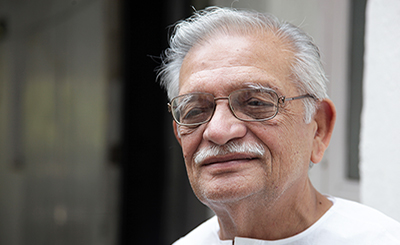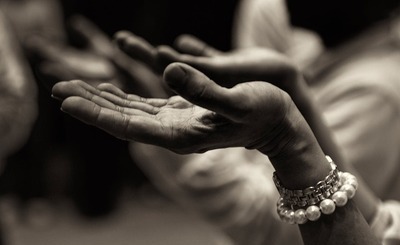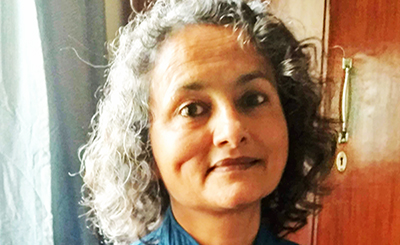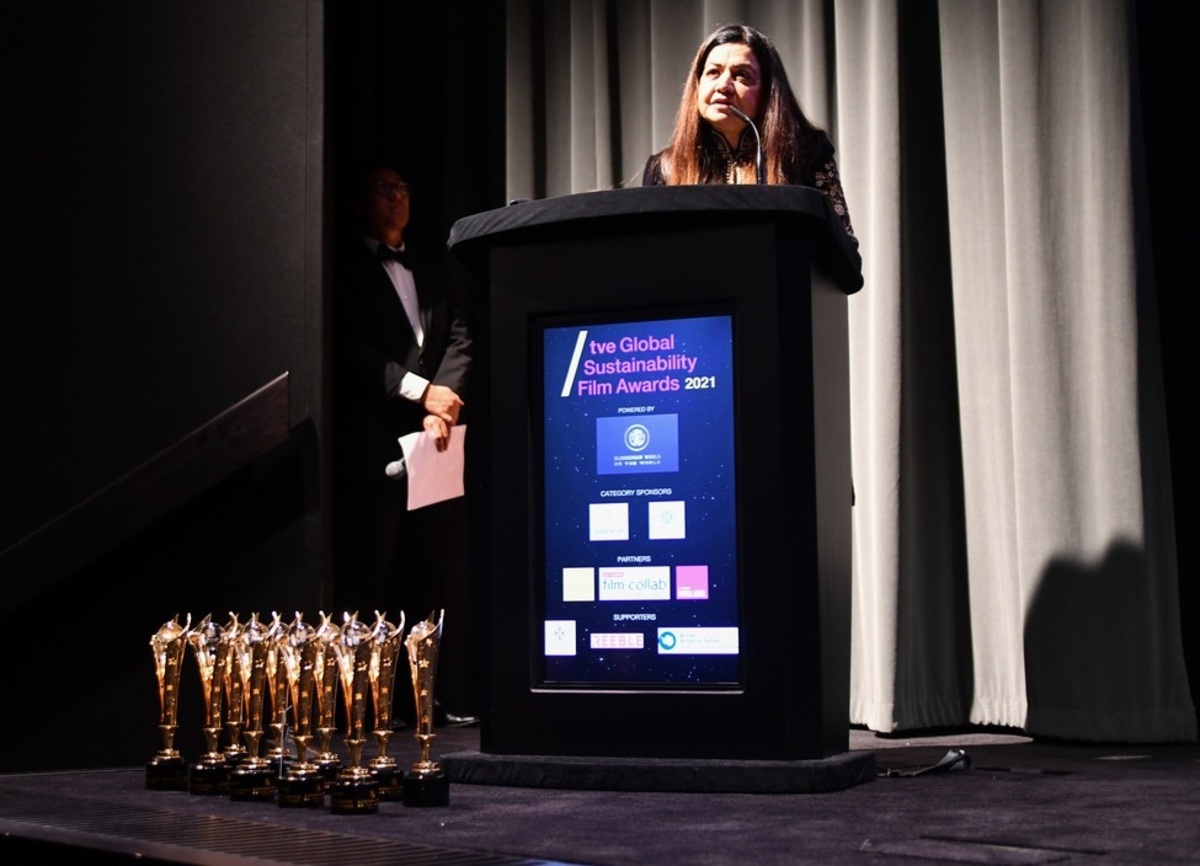
Surina Narula addressing the gathering at 10th Anniversary tve Global Sustainability Film Awards (GSFA) 2021 in BAFTA London. Photos courtesy of GSFA
“We must not be confused about what freedom is. Basic human rights are simple and easily understood: freedom of speech and a free press; freedom of religion and worship; freedom of assembly and the right of petition; the right of men to be secure in their homes and free from unreasonable search and seizure and from arbitrary arrest and punishment.” Eleanor Roosevelt, 1948.
When Eleanor Roosevelt, the former First Lady of the United States, made this speech over seven decades ago, she had no idea that in 2023 her words would ring relevant, and with all that has happened since, women are, even today, being forced to wear what they are prescribed (Iran) and have to bear the child of a rapist or give birth even if they die in the process because even in a democracy like the USA, in certain states, abortion is denied. She has no right over her own body. This is today’s world. Phyllis Nagy’s 2022 film Call Jane, which talks about this right with a very powerful story, won the Global Sustainability Film Award (GSFA) in the feature-length category.
Be it Iran, Afghanistan, the US or the world’s indigenous communities, women are in the forefront and it is time to recognise the fact that in the fight to save our planet, human rights are a major battlefront.
The GSFA recognises outstanding films from business, non-profit, media and creative sectors that inspire audiences with real-world solutions for a more sustainable future. This award, in its 11th year, is held in London. Sustainability is not only the buzz word today but a stark warning none can avoid, and governments, institutions, businesses and NGOs globally gather for environment and sustainability summits to find solutions. I attended the COP26 and COP27 as a representative of Television for Environment (tve) which hosts the GSFA awards. The summit was attended by the countries that signed the United Nations Framework Convention on Climate Change (UNFCCC) — a treaty that came into force in 1994. Importantly, the treaty encapsulates preventing “dangerous” human interference with the climate system is the ultimate aim of the UNFCCC.
Is this not what humans aimed for, always? It was a thought process ingrained within our social growth process. As a child, I remember recycling everything. Maybe I am too old but where did we disconnect with nature? Does anyone remember? I still walk across huge supermarkets, disgusted at the choices. It may please most people as a matter of choice, but I prefer individually-run shops for my veggies and grocery, even in London. Why does anybody need 500 varieties of cereals and soaps? The plastic that goes into packaging is a joke. We simply speak the language of sustainability and cannot give up or understand the damage we cause to planet Earth by simply choosing the wrong style of living and choking Nature’s kindness.
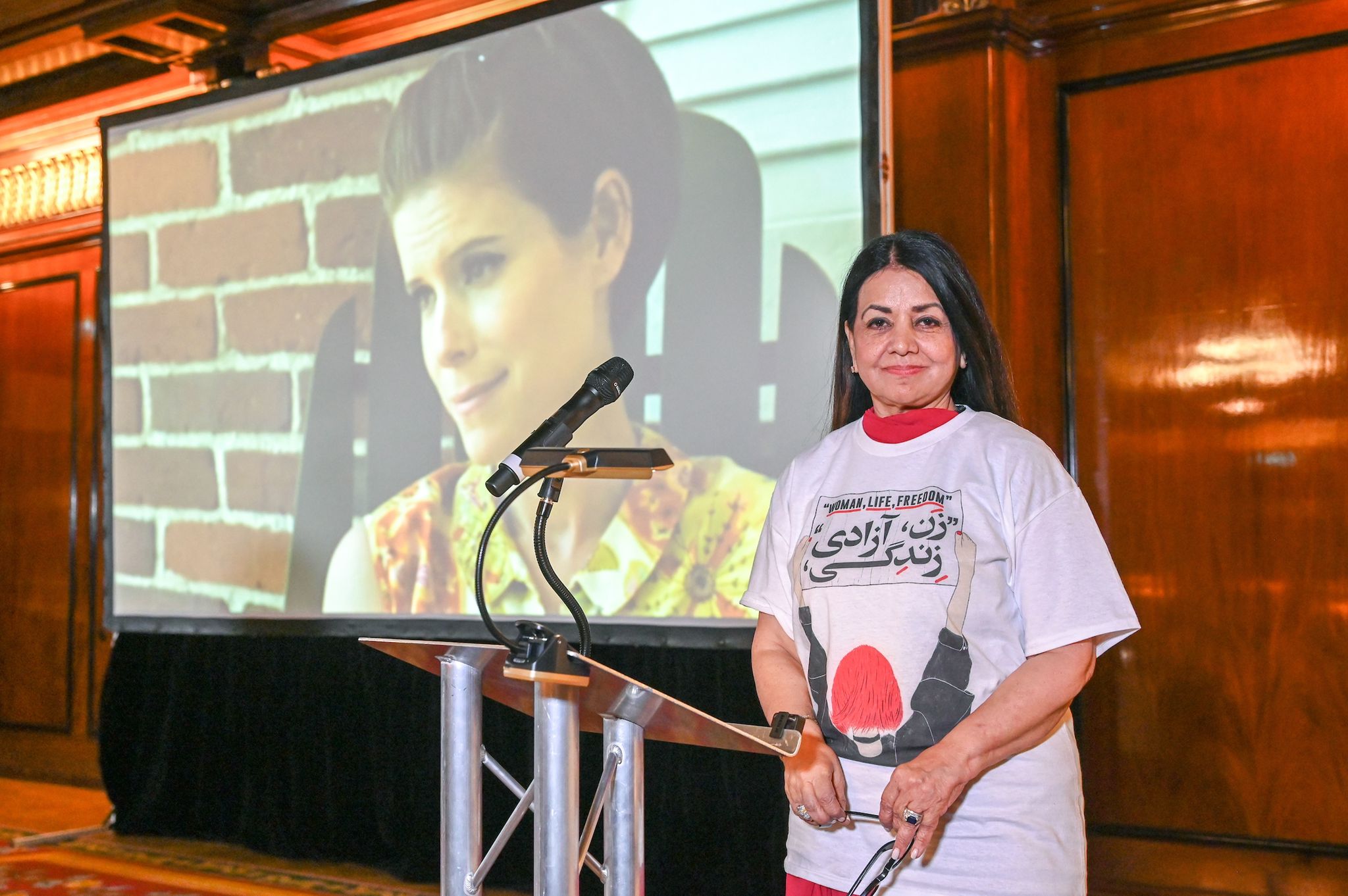
Surina Narula, founder of the tve GSFA, at the tve GSFA 2022 Awards Function at the Merchant Taylors' Hall in London
COP26 was my first experience so I drove in a Tesla to Edinburgh from London to see first hand the electric wonder. By the end of the journey, I realised that just like the iPhone, the specific chargers had to be changed with new models and therefore the chargers enroute were not the ones I needed — sustainability or another company trying to make mega bucks? Yet at the innovation zone at COP26, I saw the introduction of universal chargers which gave me hope. Why is it that every solution we offer for the climate crises is yet another way to make more money and we hide every exploitation we need to do to achieve this new sustainable product? The crisis caused by the solutions for the climate change emergency will be the next conferences held in the future I believe. But can climate emergency triumph over selfish capital market interest? Can there be a way forward to satisfy partisan interests while saving the onslaught of climate rage?
At COP27 in Sharm El Sheikh, I discovered the new city being built in Saudi Arabia, which promises to be a completely sustainable city in the middle of the desert. It fascinated me but my idea of organic nature and the wilderness created over centuries, which I enjoy revisiting, left me a bit unsatisfied. Can humans recreate nature in its pristine form which has, through generations, kept us in a balanced existence?
Man-made solutions cannot compete with nature. Don’t get me wrong; I love technology and the idea of the flying man fascinates me the most. How would I just wave my wings and take off when I do not have wings to start with? I am a sucker for new technology and the Metaverse. My experience with the VR headset is absolutely amazing and allows me to travel to the Amazon in my bedroom.
Unfortunately, that artificially created experience cannot match the joy of running through meadows or actually smelling a rose in my garden. It cannot be equalled to the forced nature provided in an artificially controlled environment where I could be forced to live in the future because of the world being destroyed by us bit by bit. I wonder if our children realise that or even go to the garden to smell the roses. Maybe they get what they deserve: a city built by Robots and artificially induced smells of nature’s beauty, which for us came naturally, organically.
My takeaway from both COP26 and COP27 which were also, by the way, adding to the carbon emissions by the number of jets and people travelling to the event, was that why this is not considered and instead conduct it virtually? A key figure in the fight against climate change is 1.5 degrees. But what will happen if we surpass it? Just visualise this: A further rise in temperature in a village in India in summer will mean that people will not be able to sweat during a heat wave. It will be like a sauna. It will cause millions to die like flies. Most people don’t have air conditioning and those who do will have power cuts. Clearly, climate change is now a matter of life and death. It needs more serious and sustained discussion throughout the year and not just at any annual conference.
The films submitted to GSFA tell us real life, on-the-ground stories of the havoc which is going to be unleashed if we don’t act now and it seems that gender equality is a crucial and imperative missing link in the achievement of all our grand plans.
Truly, a reasonable explanation for this is the fact that during a climate crisis, women and children bear the brunt of the problem. The need for concrete, transformative climate action, with female leadership and agency at the heart of decision-making is dependent on gender equality. Simply put, if women, who comprise half the world population, don’t have a voice how will they be able to tell you how they suffer? Without their equal participation how can this dangerous disaster be prevented by changing or making policies on climate action. Regrettably, from all reports around the world in many countries, we are going backwards on gender equality. For instance, the latest being the withdrawal of women from humanitarian work on the ground in Afghanistan.
While the most talked-about achievement of COP27 was an agreement to establish and operationalise a new loss and damage fund for vulnerable countries hit hard by climate disasters, these conferences, besides being a ceremonial success for country heads, do achieve a few successes like the signing of such agreements. Implementation is another story altogether.
In our effort to bridge the gap and exhibit our efforts through storytelling, GSFA encourages film makers to submit films with solutions. With the strong divide between the global South and North in this climate crisis, it was noteworthy that two Indian films won this year. Both represented solutions: one was ‘Water for Life’ by Sara Khongsai. Set in the wettest city Cherrapunji, where the people face water shortage, it shows how water harvesting methods have been designed now to store water.
The second film is ‘Bad Blood’ by Naman Govil (Vice Media), the Greener Living Short Film Award Winner. This film is about a poacher who becomes a forest conversationist. It is an engaging short documentary that promotes biodiversity through human-driven solutions to reduce poaching. The feature film award in the past has also been won by an Indian filmmaker. Alankrita Shrivastava’s ‘Lipstick under my Burkha,’ made under Prakash Jha Production and highlighting gender equality issues, is a shining example.
While governments exhibit upmanship, the climate crisis will wait for no man. It is us, the global population, which needs to re-establish balance, which will be impossible without the active participation of women. They remain a key thread for sustainability. Be it Iran, Afghanistan or the rest of the world.
More from The Byword
Comments
*Comments will be moderated





